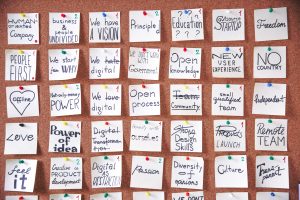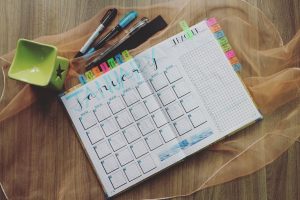
(Pexels – Annushka Ahuja)
It can be challenging to study when you’re juggling several classes, assignments, and tests. The large number of students that seek academic assistance from firms is evidence of the difficulties that academics bring.
Creating a study routine that improves focus and productivity can assist you in staying on track and meeting your academic objectives.
We’ll provide you with some useful advice in this guide to assist you in creating a study regimen that improves productivity and focuses so you can get the most out of your study sessions.

(Pexels – Polina Zimmerman)
1. Set specific goals
Setting precise goals helps you become more aware of what you want to accomplish. This enables you to prioritize your work and cut down on time wasted on activities that don’t advance your goals as a whole.
Specific goals can also be a fantastic source of inspiration because knowing what you want to accomplish gives you the drive to act.
Setting defined goals can provide you with a clear path to follow, which will help you keep on track and prevent feeling overwhelmed. Plan daily, weekly, and monthly goals when making goals so that you can see clearly what tasks you need to achieve.
You should consider a study plan to set realistic targets and avoid frustration from setting unrealistic goals. There are also websites that provide professional services, like Domyhomework123.
However, do note that we only included them for reference and research material. Do take note of plagiarism and only these services as references.

(Pexels – Bich Tran)
2. Create a schedule
A schedule enables you to properly manage your time. You may ensure you’re allotting enough time for each task and prevent procrastination by segmenting your day into discrete blocks of time for various activities.
A schedule also aids in work prioritization, ensuring you’re doing your most important and time-sensitive jobs by setting particular times for various activities.
Establishing a routine, and a schedule may teach your brain to be more productive at specific times of the day. This will make it simpler for you to focus and stay away from distractions.
We believe that scheduling is crucial because it encourages you to take responsibility for your actions. You may keep track of your progress and hold yourself accountable for achieving your objectives by assigning specified times for each task.

(Pexels – Ron Lach)
3. Eliminate distractions
Distractions can break your flow of thought and disrupt your concentration, making it challenging to maintain your attention on your work. You can work more efficiently and remain more focused on the task at hand by reducing distractions.
Eliminating distractions is crucial in ensuring your effectiveness as you can create better work that is more accurate, comprehensive, and deliberate when you channel your focus and concentration to completing a given task.

(Pexels – Pixabay)
4. Take breaks
You can give your brain a break and recharge by taking breaks. When you take a break, your mind has an opportunity to unwind and reset, which makes it simpler for you to concentrate when you get back to work.
Taking breaks can help you remember things better as breaks enable your brain to organize and synthesize the knowledge you’ve acquired, which might enhance your memory and comprehension.
By assessing the amount of work you have finished and picturing your progress, breaks might help you feel more motivated and energized. When you take a break, you offer yourself the opportunity to step back from your work and return with a new perspective and vigor.
Additionally, taking breaks can help reduce burnout. You may prevent feeling overwhelmed and worn out, which can result in decreased productivity and poor mental health, by taking regular pauses.
Taking breaks also allows your mind to wander and explore novel concepts, which can result in new insights and imaginative solutions to issues.

(Pexels – Vlada Karpovich)
5. Use active studying techniques
Effective study techniques entail active learning, which involves actively participating in the content rather than passively absorbing it. These techniques include taking notes, posing inquiries, and summarizing data.
Your ability to remember the material and comprehend it thoroughly is improved by active learning, which can increase productivity.
Also, efficient time management is a component of efficient study techniques. You may manage your time more effectively and complete more things in less time by creating concrete goals and deadlines, prioritizing projects, and dividing larger work into smaller ones.
Effective study techniques could involve more than just reading and taking notes, such as practicing problems, instructing others, and making study aids. Being mentally active and avoiding boredom through variety can increase productivity.
Getting feedback on your work is a key component of efficient study techniques. You may improve your strategy by using feedback to identify your strengths and flaws. Receiving regular feedback will help you gradually increase your performance and productivity.

(Pexels – Vantha Thang)
6. Prioritize sleep and exercise
Good physical and mental health depends on regular exercise and enough sleep. You may increase your productivity by making exercise and sleep a priority by lowering your risk of physical and mental health problems.
Your energy levels may rise as a result of exercise and sleep, making it simpler to maintain attention and alertness all day. You are more likely to be effective and reach your objectives when you are feeling energized.
Stress levels can also be decreased through exercise and sleep. Reducing stress can make you feel more at ease and help you focus on your work. Stress can be a substantial obstacle to productivity. Exercise and sleep can also enhance your ability to focus and concentrate.
Your brain processes information more effectively when you exercise frequently and get enough sleep, which can enhance your productivity and cognitive abilities.
Sleep and physical activity can both foster creativity. Exercise increases blood flow to the brain, which can improve your thinking and creative processes.
Getting adequate sleep gives your brain time to organize and analyze information, which can enhance your capacity for coming up with original solutions to issues.

(Pexels – Pixabay)
Final Take
Developing a solid study routine is key to ensuring your academic success.
Consider the tips in this article to improve your study effectiveness and secure decent scores in your assignments.
Also, feel free to engage your peers and friends for assistance in revising your study routine to achieve maximum efficiency in your study.
